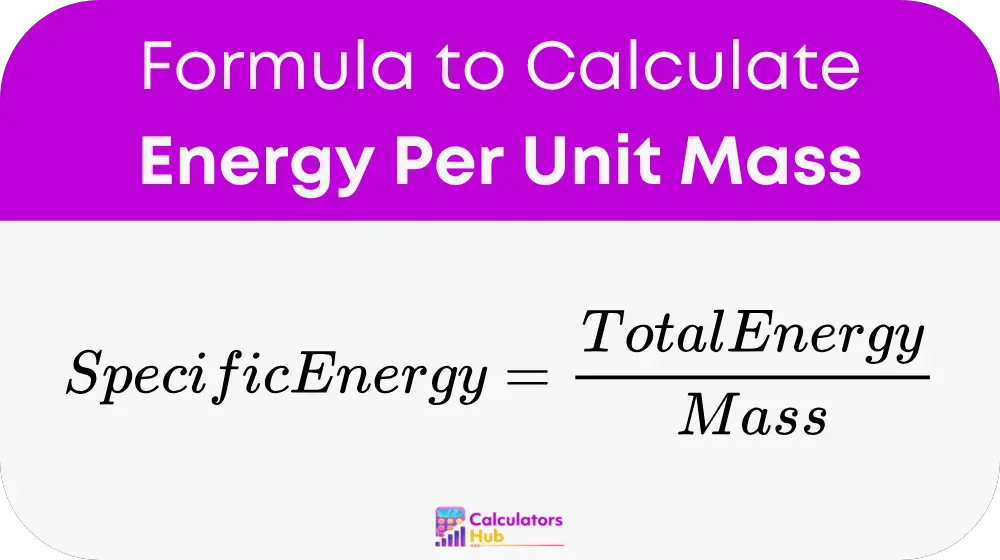The Energy Per Unit Mass Calculator helps users determine how much energy is store or use per kilogram of a substance or system. This measure, also known as specific energy, is widely use in fields like physics, chemistry, battery design, fuel analysis, aerospace, and mechanical engineering. It offers a clear picture of how energy-dense a material is. This tool belongs to the Energy and Material Science Calculator category.
Knowing the energy per unit mass helps scientists and engineers compare different materials, select more efficient energy sources, and evaluate how much energy a system can deliver for its weight.
Formula of Energy Per Unit Mass Calculator

Detailed Breakdown:
Specific Energy
This is the amount of energy per unit mass, usually measured in joules per kilogram (J/kg), kilojoules per kilogram (kJ/kg), or megajoules per kilogram (MJ/kg)
Total Energy
This is the energy contain or deliver by the system or material. It may be given in joules (J), kilojoules (kJ), or megajoules (MJ)
Mass
This is the weight of the material or object, measured in kilograms (kg)
Make sure both energy and mass units match correctly. If you're using kilojoules, the output will be in kJ/kg.
Quick Reference Table
Here’s a helpful table showing common values for materials and systems. It offers a quick way to compare energy per mass across different applications.
| Material/System | Total Energy (MJ) | Mass (kg) | Specific Energy (MJ/kg) |
|---|---|---|---|
| Lithium-ion Battery | 0.5 | 0.002 | 250 |
| Gasoline | 47 | 1 | 47 |
| Coal | 30 | 1 | 30 |
| Hydrogen | 142 | 1 | 142 |
| TNT (explosive) | 4.6 | 1 | 4.6 |
These values help users understand why certain materials are more energy-dense than others and guide their selection for transport, storage, or performance.
Example of Energy Per Unit Mass Calculator
Let’s say a fuel cell stores 90,000 kilojoules of energy and weighs 3 kilograms.
Step 1:
Use the formula:
Specific Energy = Total Energy / Mass
Specific Energy = 90,000 / 3 = 30,000 kJ/kg
The fuel cell has a specific energy of 30,000 kilojoules per kilogram, which is a high value for energy storage systems.
Most Common FAQs
Specific energy is use to compare energy density between materials. It’s helpful when weight is important, such as in aviation, batteries, or portable power systems.
Specific energy is energy per mass (J/kg), while energy density is energy per volume (J/m³). Both help evaluate how efficient and compact a system is.
Yes. It’s widely use to measure battery performance by showing how much energy a battery delivers per kilogram of its mass.